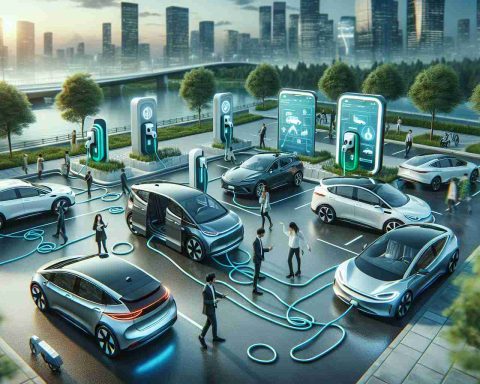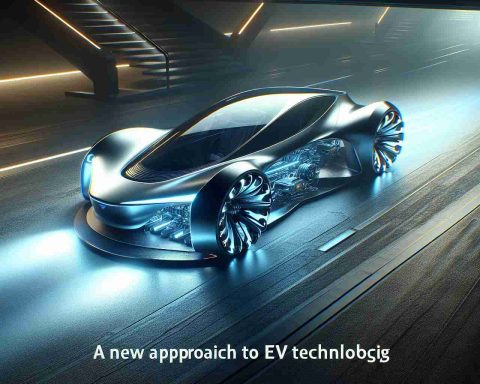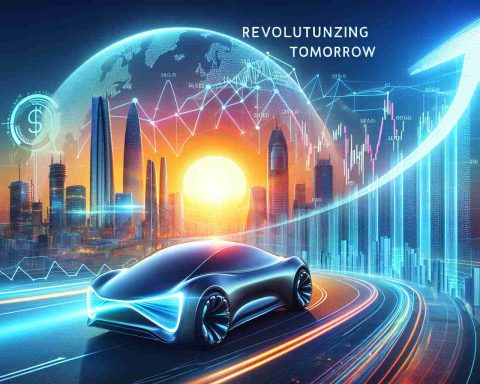As cities grapple with increasing congestion and pollution, electric vehicle (EV) car sharing schemes are emerging as a viable alternative to traditional car ownership. This innovative approach not only promotes sustainability but also offers flexibility for various users, from urban dwellers to tourists.
The concept of EV car sharing is gaining momentum across Europe, driven by a desire to electrify mobility while combating climate change. These platforms allow users to experience the benefits of electric vehicles without committing to ownership, thereby making it easier for individuals to integrate sustainable transport into their daily lives. Services like Zipcar and Share Now enable short-term rentals, often accessible via mobile apps, providing a seamless way to rent vehicles by the minute, hour, or day.
For city residents, these schemes present a practical solution, eliminating the typical burdens associated with car ownership such as maintenance, insurance, and parking. Additionally, they serve as an affordable transport option for those on lower incomes and can reduce the reliance on personal vehicles. Tourists benefit from eco-friendly alternatives to explore urban landscapes, while students find the flexibility appealing for occasional errands.
Numerous successful EV car sharing initiatives are already at work across Europe. Platforms like Zity in Madrid and Milan offer fully electric fleets, while Green Mobility in Denmark provides both electric cars and vans. Internationally, companies such as Zipcar and Turo expand access to a range of eco-friendly vehicles.
The benefits are substantial. Research indicates that electric car sharing can reduce emissions by up to 43% per user compared to conventional petrol vehicles. Shared EVs not only lower individual carbon footprints but also help decrease the overall demand for new cars, thereby lessening the environmental impact of manufacturing.
Nevertheless, challenges persist. The current scarcity of charging infrastructure can lead to “range anxiety,” deterring potential users. Furthermore, the higher initial costs associated with EVs may dissuade rental companies from expanding their fleets. Addressing these issues, however, is critical. Enhanced access to charging stations, particularly in car sharing hubs, will bolster user confidence and satisfaction.
In conclusion, while obstacles remain, the continued development of EV car sharing schemes could pave the way for a more sustainable transportation future. By promoting electric mobility, these initiatives are not only redefining urban transport but also contributing to a cleaner and greener planet. For those interested in the evolution of mobility, the shift towards electric vehicle car sharing may well be a significant chapter in the story of sustainable transit. For more insights, visit Euronews.
Driving Change: The Broader Implications of Electric Vehicle Car Sharing
The rise of electric vehicle (EV) car sharing schemes signals a transformative shift in urban transportation, with significant implications for society, culture, and the global economy. By facilitating easier access to sustainable transport options, these initiatives emerge as critical players in the battle against climate change and urban congestion.
Urbanization and Mobility Trends
As urban populations surge, the demand for efficient, sustainable transportation solutions intensifies. The proliferation of EV car sharing addresses this need by providing flexible mobility options that align with modern lifestyles. In cities where congestion and environmental degradation are pressing issues, these platforms offer a practical solution that can reshape public attitudes towards vehicle ownership.
Moreover, the emergence of these services contributes to a broader cultural shift where sustainability becomes integral to urban identity. Cities promoting EV car sharing are often seen as progressive and environmentally conscious, fostering a sense of community among users who prioritize green practices. This trend not only affects transportation but also encourages environmentally friendly behavior in other aspects of urban life.
Global Economic Impact
The transition to electric vehicle car sharing is poised to influence the global economy significantly. Reducing reliance on traditional car ownership could potentially lead to lower manufacturing demands, impacting industries from steel production to the automotive sector. As shared mobility becomes commonplace, car manufacturers may pivot to develop and produce dedicated EV fleets, aligning economic interests with sustainability goals.
In addition, reduced vehicle ownership can lead to increased investment in public transport systems, cycling infrastructure, and pedestrian-friendly urban designs. Cities that prioritize these developments can experience greater economic benefits through enhanced mobility and improved quality of life for residents.
Environmental Considerations
The environmental benefits of electric vehicle car sharing extend beyond reduced emissions. A collaborative study estimated that shared EVs could reduce urban noise pollution by up to 50%, contributing to a more livable urban environment. Furthermore, as the demand for shared electric vehicles grows, manufacturers are incentivized to improve the efficiency and sustainability of battery production, leading to innovations that can mitigate the environmental footprint of EVs themselves.
However, the need for substantial investments in charging infrastructure remains. As these schemes proliferate, the demand for charging stations will escalate, necessitating a collaborative approach between stakeholders, including local governments, businesses, and energy providers. This cooperative effort could define the future of urban planning and sustainable development.
Future Trends and Long-Term Significance
Looking ahead, the viability of EV car sharing will likely be influenced by technological advancements and shifts in consumer preferences. Enhanced battery technologies, faster charging times, and integration with smart city concepts could elevate the appeal of electric vehicle car sharing. Additionally, the incorporation of data analytics and mobility-as-a-service frameworks can enhance user experience, enabling more responsive and efficient service models.
The long-term significance of these trends is profound. As society increasingly embraces shared mobility and reduced carbon footprints, we may witness a paradigm shift wherein personal vehicle ownership is seen as less desirable. This cultural evolution could lead to more compact, efficient urban environments, characterized by reduced traffic congestion and improved air quality.
In conclusion, electric vehicle car sharing is not merely a trend—it’s a pivotal component of a larger movement towards sustainable and equitable urban mobility. As these initiatives continue to gain traction, they hold the promise of redefining transportation as we know it, while also addressing critical societal and environmental challenges. To learn more about the future of urban mobility, visit Euronews.
Emerging Trends and Considerations in Electric Vehicle Car Sharing
As the landscape of urban transportation continues to evolve, electric vehicle (EV) car-sharing schemes represent a pivotal shift in sustainable mobility. Alongside the evident benefits of reduced emissions and cost savings, there are emerging trends and considerations that potential users and city planners should bear in mind.
FAQs about EV Car Sharing
What types of EVs are available in car-sharing schemes?
Typically, car-sharing services offer a range of electric models, from compact cars ideal for city driving to larger vehicles suited for families or groups. Many services provide a selection that caters to diverse needs, from Nissan Leaf to Tesla Model 3.
How is pricing structured in EV car sharing?
Pricing may vary based on the platform, but it usually involves a per-minute or per-hour rate, often inclusive of costs such as insurance and maintenance. Some apps offer subscription models, allowing users to pay a flat monthly fee for access.
Are there any membership fees?
Many services require a one-time membership fee, which grants access to the rental platform. This fee typically covers identity verification and other administrative costs.
Quick Tips for Using EV Car Sharing
1. Book in Advance: To ensure availability, particularly during peak hours or in busy city areas, consider booking your EV in advance.
2. Charge Before Return: If you’ve used a significant amount of battery power, check if there are charging stations nearby to top off the vehicle before returning it. This helps improve fleet management and readiness for the next user.
3. Familiarize with Charging Stations: Use apps like PlugShare or ChargePoint to locate nearby charging stations before starting your trip. Knowing where to charge can alleviate range anxiety.
Pros and Cons of EV Car Sharing
Pros:
– Cost-Effective: EV car sharing eliminates the financial burden associated with ownership, such as maintenance, insurance, and long-term parking fees.
– Environmental Impact: Shared EVs significantly reduce emissions and resource demands, promoting sustainability in urban areas.
– Flexibility: Users enjoy the convenience of accessing vehicles only when needed without the responsibilities of ownership.
Cons:
– Infrastructure Limitations: The current lack of widespread charging stations can hinder the usability of EV car sharing, contributing to users’ anxiety about battery life.
– Initial Costs for Companies: Rental firms face high upfront investments in EV technology, which can delay fleet expansion.
Predictions for the Future of EV Car Sharing
The growth of electric vehicle car-sharing platforms is expected to accelerate, particularly in metropolitan regions looking to mitigate pollution and congestion. With technological advancements and increased investments in charging infrastructure, the convenience and affordability of these services will likely improve, drawing more users.
Furthermore, as cities implement stricter emissions regulations, the integration of EV car sharing with public transport systems might provide a seamless mobility solution, promoting multi-modal transportation networks. This could also facilitate more localized and sustainable urban development.
Conclusion
Electric vehicle car-sharing schemes are not just about providing transport; they symbolize a broader shift towards sustainable urban living. By tackling not only environmental concerns but also affordability and accessibility, EV car sharing initiatives hold the potential to reshape urban mobility for years to come. As the popularity of these services grows, they will play an essential role in facilitating the transition to a more eco-friendly future. For further exploration on sustainable transportation, visit Euronews.


















